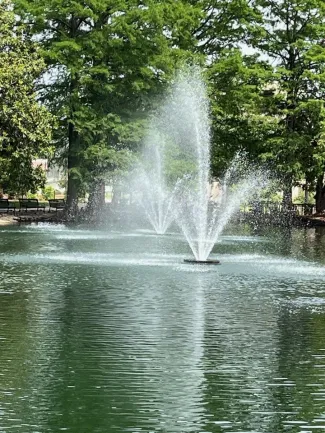Pond aeration can provide many benefits to your fishing pond and help fight several common pond problems that you may encounter. While it is not a magic bullet, it can be an integral piece in your pond management plan. If pond owners are hesitant about the cost of installation, that’s understandable, but the benefits may make it worthwhile if you are constantly fighting poor water quality, fish kills, and other water-related issues.

Pond aeration can provide many benefits to your fishing pond and help fight several common pond problems that you may encounter.
When thinking about the reasons for aeration, the primary reason is to increase the amount of oxygen in your pond. There is a delicate oxygen balancing act that occurs in many ponds every summer. This diurnal oxygen cycle is reliant upon photosynthesis to provide oxygen during sunlight hours. After dark, no oxygen is being created but all things aerobic are still respiring. Fish kills can occur when all of the oxygen is depleted before the day breaks. Ponds like this are on a knife’s edge only requiring something as simple as a cloudy day or an algae die-off to crash the oxygen and kill fish. This is where aeration can help.
There are differing types of aerators: paddlewheel, air diffusers, fountains, surface pumps, and more. These all work to churn the water and create more surface area for water and air to connect and re-oxygenate the water. When using aeration in the summer, you can set the pump on a timer to kick on at dark and turn off at day break. This provides the oxygen when it’s most needed, a critical stop-gap in the oxygen cycle.
Aeration does more than just prevent fish kills; it can help the overall health of your pond and fish. Just like an aerobic septic system provides oxygen for beneficial bacteria to process organic matter, pond aeration does the same which helps reduce a build-up of muck and organic matter at the substrate level. It also improves water circulation and reduces stagnation. If you have a deep pond that is prone to stratifying in the summer, a properly sized and placed diffuser system can mix the water and eliminate the anoxic layer. Removing this layer of anoxic water allows fish to utilize the whole pond, and eliminates fall turnover, another time when fish kills can occur.
While this is far from an exhaustive list of how aeration can help ponds, I hope it shows that the benefits, if not outweigh, at least offset the costs of installation. This short article is too brief to thoroughly get into the details of aeration setups such as proper sizing, type, layout etc. but I hope it’s enough of a primer to motivate you to dig into the details and see if aeration is right for you and your pond. Contacting your local ODWC Fisheries biologist would be a great place to start!